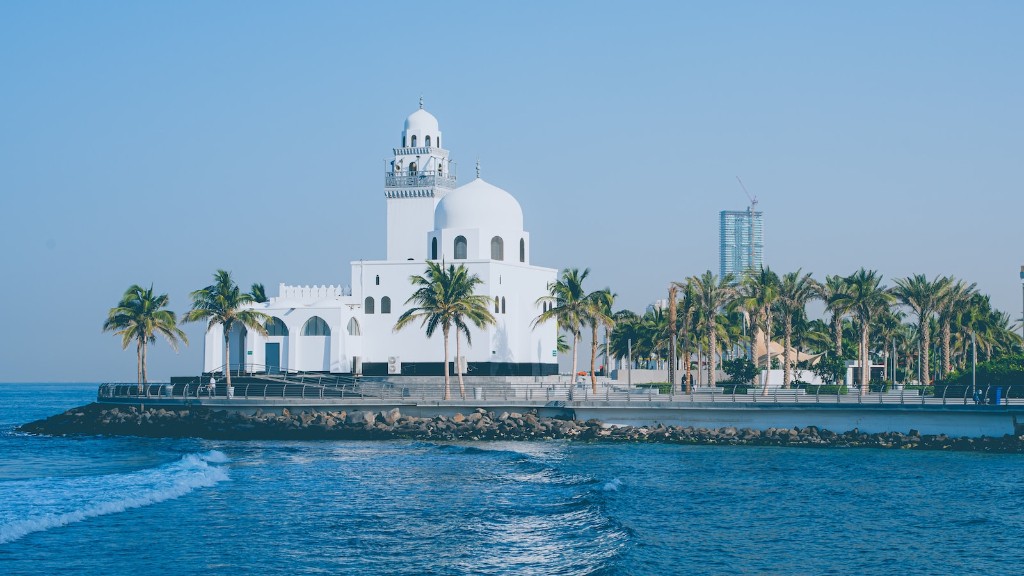Saudi Arabia is located in the middle east, and spans an area of over 2.1 million square kilometres. It has a population of over 33 million people, making it the 13th most populous country in the world. But did you know that the country is in a different time zone than the rest of the world? In this article, we will explore what time zone Saudi Arabia is in, and find out why.
Saudi Arabia is located in the Arabian Standard Time Zone (AST), which is three hours ahead of Universal Coordinated Time (UTC). That means that while other countries like the United States are in the UTC-5 time zone, Saudi Arabia is in the UTC+3 time zone. Another way of thinking about it is that the clocks in Saudi Arabia are usually two hours ahead of clocks in other countries in the same time zone.
The introduction of the time zone was spearheaded by King Abdulaziz Al-Saud in 1950, when he passed a law that officially changed the country’s time zone to the one we know today. This was done in an effort to synchronize the country with the rest of the Middle East, which were already observing the Arab Standard Time Zone.
Most of the country is in the same time zone, but it is worth noting that there are some areas that are in different time zones. The eastern provinces of Saudi Arabia, which is near the border with Yemen, observe Yemen Standard Time, which is one hour ahead of AST.
The change of time zone affects different areas in different ways. For example, in the business world, the change of time zone means that many businesses in the country are able to conduct international trade earlier in the day. This means that the country is able to take advantage of opportunities in the global market even sooner.
Likewise, the adjustment to the time zone has also had an impact on other aspects of life in Saudi Arabia. For instance, the Muslim community is able to conduct religious rituals and prayers at the appropriate time. Also, students are able to plan their day more easily, as the time zone change means that they can schedule their classes around the time they wake up and go to bed.
Different Time Zones Worldwide
The world is divided into 24 time zones, with the International Date Line being the point at which the various time zones connect with each other. Most time zones are based on 15-degree increments of longitude, meaning that they span 15 degrees of longitude. Some countries, such as Saudi Arabia, span multiple time zones, but generally, the world is divided by the 24-hour clock.
Understanding the various time zones can be useful in a number of ways. For example, knowing what time zone a country is in can be helpful when planning international meetings and conferences. It can also be useful for planning trips, as well as scheduling video calls with people in different countries.
Furthermore, understanding the different time zones can also be useful in understanding the history and culture of different countries. For example, in Saudi Arabia, the use of the Arabic Standard Time Zone was introduced by King Abdulaziz Al-Saud in an effort to synchronize the country with its neighbours.
In the business world, it can be beneficial to understand the different time zones as different countries usually have their own peak business hours. This means that businesses in different countries can be trading with each other at different times of the day, depending on their time zone.
How is Daylight Savings Time Handled in Saudi Arabia?
Daylight savings time, also known as summer time, is a practice used by many countries to adjust their clocks during the summer months in order to take advantage of the longer days. In Saudi Arabia, the practice is not implemented, as the country does not observe daylight savings time.
The reason for this is that the Islamic calendar does not involve the adjustment of the clock, and as such, it would be inappropriate to disrupt prayer times, which are set in accordance with the sun’s position in the sky. As a result, the government has decided to not implement daylight savings time and the clocks remain in the same time zone all year round.
The lack of daylight savings time also means that many people in Saudi Arabia do not see a change in their daylight hours during the summer months. As a result, some people in the country have taken to using the digital versions of clocks and watches in order to see the current time and also to set alarms or reminders.
Overall, the lack of daylight savings time does not have a major impact on life in Saudi Arabia, as many of the schedules and routines are set according to the sun’s position in the sky. However, it is worth noting that there are some aspects of life in the country that are affected by the lack of daylight savings time, such as international meetings and conferences, as well as video calls with people in different countries.
Does Saudi Arabia Have A Set Working Week?
The working week in Saudi Arabia is similar to other Arab countries, with Saturday to Wednesday being the official days of work. The weekends in the country are Thursday and Friday, as in most Arab countries. That said, Saturday is usually considered to be a half-day, with many businesses and government offices closing at midday.
The length of the working day in Saudi Arabia is typically 8 to 10 hours, depending on the sector. For example, in the private sector, the working day is usually 8 to 10 hours, whereas in the public sector, the working day is usually limited to 8 hours.
The working week in Saudi Arabia is also regulated by labour laws, which are designed to protect the rights of employees. For example, the laws ensure that employees in the country are paid overtime for any additional work they do outside of their normal working hours.
Overall, the Saudi Arabian working week is similar to other Arab countries, with Saturday to Wednesday being the official days of work and the weekends falling on Thursday and Friday. That said, the working week is regulated by a number of laws designed to protect the rights of employees, such as provisions for overtime pay.
Is Time Difference Between Saudi Arabia and Other Countries an Issue?
The differences in time zones between Saudi Arabia and other countries can have implications for anyone planning to travel between them. For example, there may be an issue with changing planes, as the short layover times may not be long enough to accommodate the time difference.
Likewise, there may also be complications with arrival and departure times for flights departing from or arriving in Saudi Arabia, as the time difference could mean that flights are landing or departing earlier or later than scheduled.
Furthermore, the time difference can also cause issues for people who are working with colleagues or clients in other countries. For example, meetings and conferences between different countries may take place at different times of the day due to the time difference, meaning that one party may have to stay up late or get up early in order to accommodate the other.
Overall, the time difference between Saudi Arabia and other countries can have implications for anyone travelling between them, as well as for people working with colleagues or clients in other countries. That said, it is not necessarily a major problem, as most people are able to adjust their schedules to accommodate the time difference.
What are The Benefits of A Different Time Zone?
While there may be some difficulties associated with having a different time zone than the rest of the world, it is worth noting that the time zone is also beneficial in a number of ways. One obvious benefit is that Saudi Arabia is able to synchronize itself with its neighbours in the Middle East, allowing it to take part in activities that its neighbours are involved in.
The change of time zone has also had other benefits. For example, it has allowed the country to open its doors to international trade earlier in the day and also allowed the Muslim community to conduct their religious rituals at the appropriate time. Furthermore, the change has also made it easier for students to plan their day.
Overall, the change of time zone is beneficial in a number of ways and has allowed the country to take advantage of opportunities in the global market earlier in the day. It has also made it easier for people in the country to plan their day more easily, as the new time zone takes into account the sun’s position in the sky and not the time of day.
Conclusion
Overall, Saudi Arabia is located in the Arabian Standard Time Zone (AST), which is three hours ahead of Universal Coordinated Time (UTC). The introduction of the time zone was spearheaded by King Abdulaziz Al-Saud in 1950, with the change having both positive and negative implications. The time zone can sometimes cause complications for people travelling or dealing with colleagues in other countries, but it also has a number of benefits, such as allowing the country to open its doors to international trade earlier in the day.





